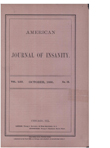Age-dependent decline of attention deficit hyperactivity disorder
Abstract
OBJECTIVE: This study was undertaken to assess whether the diagnosis of attention deficit hyperactivity disorder (ADHD) is retained from childhood into adulthood. METHOD: A search of the literature yielded nine prospective studies in which cohorts of children with the disorder were formed and then reexamined 4-16 years later to determine the level of retained ADHD. The resulting data were subjected to nonlinear regression analysis to ascertain the relationship with chronological age. RESULTS: The data followed an exponential decline over time to a high degree of accuracy. CONCLUSIONS: The rate of ADHD in a given age group appears to decline by 50% approximately every 5 years. If a prevalence of ADHD in childhood of 4% is assumed and the exponential decline extrapolated, the estimated rate of adult ADHD ranges from about 0.8% at age 20 to 0.05% at age 40.
Access content
To read the fulltext, please use one of the options below to sign in or purchase access.- Personal login
- Institutional Login
- Sign in via OpenAthens
- Register for access
-
Please login/register if you wish to pair your device and check access availability.
Not a subscriber?
PsychiatryOnline subscription options offer access to the DSM-5 library, books, journals, CME, and patient resources. This all-in-one virtual library provides psychiatrists and mental health professionals with key resources for diagnosis, treatment, research, and professional development.
Need more help? PsychiatryOnline Customer Service may be reached by emailing [email protected] or by calling 800-368-5777 (in the U.S.) or 703-907-7322 (outside the U.S.).



